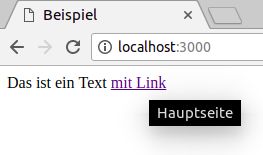1.0.3 • Published 8 years ago
pug-i18n-postparse v1.0.3
pug-i18n-postparse
Why
Because the international support is too difficult otherwise.
Not need to call always the t (translation) function everywhere. Just enjoy it :)
Install
npm i pug-i18n-postparse
Example
You can use pug without any special:
html
head
title Example
body
p This is a text
a(href="/", title="Main page") with link
Define the translation json
{
"de": {
"Example": "Beispiel",
"This is a text": "Das ist ein Text",
"with link": "mit Link"
},
"hu": {
"Example": "Példa",
"This is a text": "Ez egy szöveg",
"with link": "linkkel"
}
}...or if you want use different text in base language, you can specify that...
{
"en": {
"Example": "An example",
"This is a text": "This is a text",
"with link": "with link"
},
"de": {
"Example": "Beispiel",
"This is a text": "Das ist ein Text",
"with link": "mit Link"
},
"hu": {
"Example": "Példa",
"This is a text": "Ez egy szöveg",
"with link": "linkkel"
}
}After that, you can use it from express
const app = require('express')();
const pugI18nPostparse = require('pug-i18n-postparse');
const languageFilePath = __dirname + '/i18n.json';
app.set('view engine', 'pug');
app.set('views', __dirname); // or your views directory
app.use(pugI18nPostparse.express('en', languageFilePath)); // define the default language
app.get('/', function (req, res, next) {
res.locals.language = 'de'; // you can pass the selected language in locals
res.render('index');
});
app.listen(3000);You can use your express middleware for language selection
const app = require('express')();
const pugI18nPostparse = require('pug-i18n-postparse');
const languageFilePath = __dirname + '/i18n.json';
app.set('view engine', 'pug');
app.set('views', __dirname); // or your views directory
app.use(pugI18nPostparse.express('en', languageFilePath)); // define the default language
app.use(function(req,res,next){
// this is a place, where you get your user preferred language - for example from request header, or user settings
res.locals.language = 'de'; // you can pass the selected language in locals
next();
});
app.get('/', function (req, res, next) {
res.render('index');
});
app.listen(3000);You can use your own i18n implementation:
function myI18nImplementation(text, language){
// your magic here
let retValue = text.replace(/^(")?.*?(")?$/,'$1Marklar$2');
return retValue;
}
const app = require('express')();
const pugI18nPostparse = require('pug-i18n-postparse');
app.set('view engine', 'pug');
app.set('views', __dirname); // or your views directory
app.use(pugI18nPostparse.express('en', myI18nImplementation));
app.get('/', function (req, res, next) {
res.render('index');
});
app.listen(3000);The result is:
<html>
<head>
<title>Marklar</title>
</head>
<body>
<p>Marklar <a href="/" title="Marklar">Marklar</a></p>
</body>
</html>See the examples